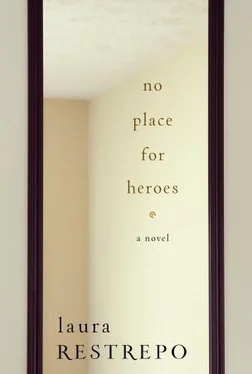“The brand is Swibo, Lorenza, can you imagine? Think of Swiss Army knives but for butchers, with yellow, ergonomic handles. He had at least twelve of these, all different sizes. There was one that looked like an ax, I swear. They were some impressive weapons.”
“If you want, we can practice some target tossing,” Uncle Miche proposed and pulled out another set of knives, specifically for throwing, and began to toss them against a board. Mateo told Lorenza that Miche almost always hit the bull’s-eye.
“Me, on the other hand, I didn’t hit it once. It’s difficult to throw a knife. Have you ever tried it? You have to grab it by the blade, but like this, so as not to cut yourself, and wham, you chuck it. I was a sissy with that and Miche made fun of me. But in a good way, right? He didn’t want to offend me with his ridicule, or make me feel bad. He also has a retractable rattan stick for Filipino kali, a scimitar, and a professional nunchaku. He let me play around with all of them for a while.”
“Was Grandmother Noëlle also living there when she died?”
“No, she was somewhere else, with Ramón. She lived at Villa Gesell until my grandfather died and then she went to live with Ramón, I don’t know where.”
“Do you know why they fought, Miche and Ramón?”
“No.”
“Did you ask?”
“Yes, but I think he didn’t respond.”
“Could it have been because of that story of the robbery and prison?”
“Maybe. Told me the same stuff about what we already knew, but in the James Bond style, you know, the hero mode. What was new was that he said that my father told him he wanted the money to organize a political party.” Miche wanted his half to open the butcher shop, and Ramón wanted to continue the revolution. That was what Miche told him. “Then he asked me if I’d like to take a walk along the beach and we went, but we stopped at a tin shack on the shore, and he ordered a beer and treated me to a Coca-Cola. He said that if the sea settled down we could go out on the boat, and I liked the idea, but in the end the sea did not settle down.”
“Was the beach pretty?”
“Not really. It was cold and there was garbage. Uncle Miche said that in summer it became spectacular.”
“Coronda was a wonder in those days. The city bus your uncle Miche drove,” Lorenza said, “it was decorated in black lights, with psychedelic motifs and red tasseled drapes that swayed at every stop and jolt. He had installed hundreds of bulbs, like on a Christmas tree, which turned on whenever he braked. Not to mention the sound equipment and a high-decibel collection of tapes he’d recorded, of whatever songs were popular then in the city.”
“A magical traveling discotheque.”
“Yes. And he succeeded, Miche, believe you me. He had his success with girls, who when getting on the bus were delighted to see him there, driving, a real lord of the night with his black tie, blue shirt, and sunglasses, cruising through the sleeping city in his fiery ship with black lights to the beat of some psychedelic romantic ballad. That’s how he picked up Azucena. Then when they became a couple, she put up photos of them on the dashboard, on the outside, and made him paint her name in phosphorescent letters on the body of the bus. One out of every ten nights, Miche was off and then we would take the bus out. Your father equipped it with Campari, soda, olives, crackers, mayonnaise, pickles, and sausages, and we were off and running for the night through Buenos Aires in our own private traveling club. Those were good times, kiddo.”

EVERYTHING THERE WAS bright, like in a dream. The sky was light blue and the world seemed soft and gentle under the snow. In the background loomed the formidable mountain range that was duplicated, in mirror image, on the lake, with a wisp of smoke rising from the chimney of the log cabin in the foreground. Behind it lay a pine forest stretching up toward the low hills, and down one of them, on an old horse, a man was approaching with a small child tucked in front of him. He held the child in place with his arms as he gripped the reins. Both were protected from the cold with hats, sweaters, and scarves, brightly colored, and the boy looked like a miniature reproduction of the man. As they approached, Lorenza perceived an absolute calm in the boy’s expression. He was happy, she realized. He had been happy, the entire drama has not affected him at all, she thought, and a sense of relief allowed a smile to appear on her face for the first time in a long while. Ramón made the boy turn his eyes to where she was.
It took a few moments for Mateo to recognize her and then the boy stirred with joy, shocked by the surprise. He began yelling at her to look at the snow, and the horse, and the snow, and was determined to point them out to her as she ran to meet him, the boy still in the arms of his father, and then embraced him, holding him against her chest with all the strength of her soul, falling to her knees in the cold snow.
Two days earlier, in Bogotá, Ramón’s second and final phone call had come in, and this time they had talked at length. Not about the child, which was the only thing that interested her, she had to bite her tongue again and follow the thread without interrupting the conversation to ask him about the boy. They spoke instead about reconciliation. Ramón raised the possibility and took the initiative and Lorenza echoed it, saying only what she believed he wanted to hear. To everything she responded with a positive, she asked for forgiveness, granted forgiveness, told him she was very sad over the breakup of the relationship, agreed that in Bogotá things had gone very wrong, recognized the infinite class arrogance of herself and her family, agreed to try again, to start over, to love each other like before, she’d return to Argentina, they’d raise their child there, watching him grow up together, making a fresh start, betting on happiness.
“Sad, that you had to tell so many lies,” Mateo said to Lorenza.
“I didn’t tell them, Tranzor Z did.”
“That’s one fucked-up robot.”
“One who’s been stripped of her child and didn’t care about anything except getting him back.”
“Poor Ramón, it was some cowardly shit he came up with to shake you down.”
The call was made from a public phone, somewhere in Argentina, but impossible to identify where exactly. But it wasn’t necessary; Ramón announced that within a few hours he would be sending a prepaid airline ticket. She claimed the ticket, and saw that it was one-way for the next morning at ten thirty, from Bogotá to Buenos Aires.
For her, it was very clear that this journey had but one goal: to recover Mateo and return with him. Against Ramón’s will. Despite all the precautions that Ramón would take to stop her from doing so. She discussed with her family whether she should be accompanied, and everyone volunteered to travel if necessary. But that would be a declaration of war, and in this conflict she was the one who stood to lose the most. From then on, she would have to figure things out on her own.
She left on that plane alone, already aloft on anxiety and expectation, alone again to Buenos Aires, once again with dollars hidden and false passports, as if Argentina were a magnetic field, a place that would require her maximum effort and put her to the test, once more, as if the cycle had begun again in perfect symmetry. But it was a perverse symmetry, distorted, because this time the war would be over, and her enemy would be someone who had once been her closest ally. She wanted to ask herself when and how things began to turn into this, but she did not. She would dismiss any thought that opened the door to confusion. She could not give accommodation to anything not having direct bearing on what she should do, how she should act, when.
Читать дальше













